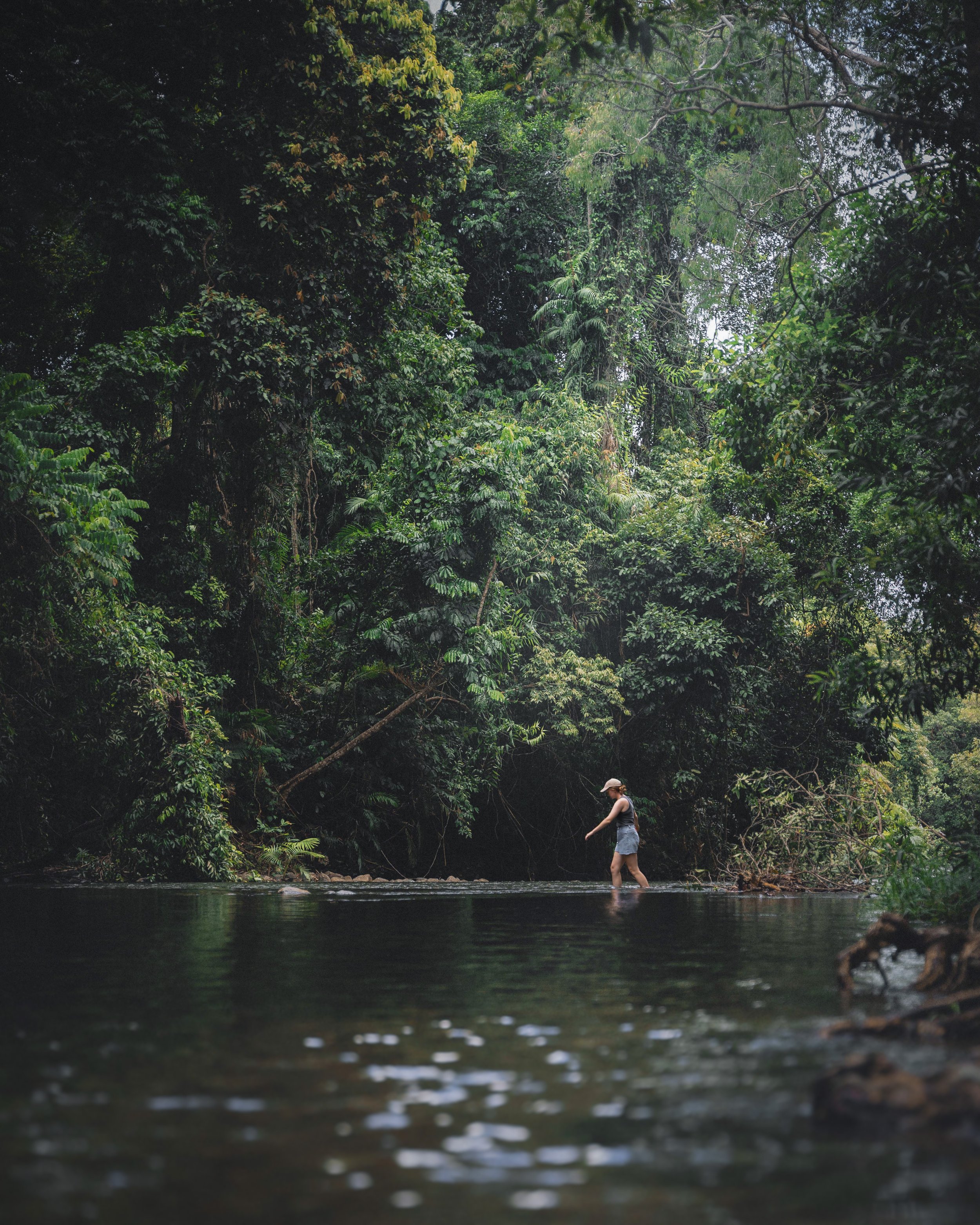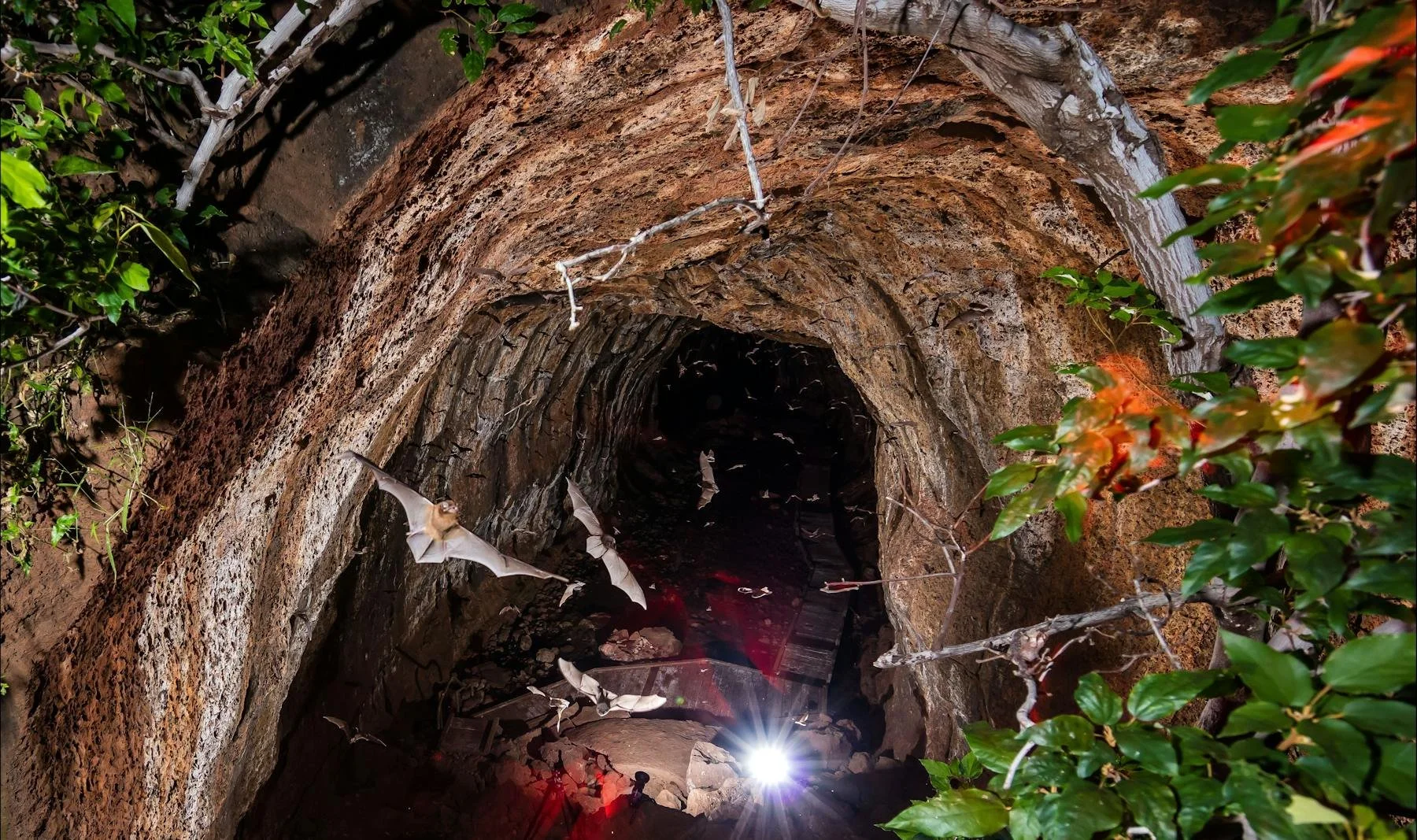
Far North Queensland
Wildlife Photography Workshop
11th - 20th August 2024
Join me on a 10 day adventure through the wet tropics and outback Queensland, on a quest to photograph some of Australia’s most weird, wonderful, and beautifully elusive creatures!
Highlights:
Spend 10 days with Kate as we explore the breathtaking beauty of Far North Queensland and photograph an abundance of incredible species.
Learn from our expert field guide throughout the trip, as he shares his knowledge and experience of the FNQ environment and the animals we encounter.
Enjoy 2 nights in the magical Daintree rainforest; the oldest rainforest on Earth and one of the most biodiverse ecosystems on the planet.
Visit Tolga Bat Hospital, the largest bat rehabilitation facility in Australia specializing in spectacled flying-foxes.
Spend 3 days in outback Queensland, searching for larger mammals such as kangaroos, wallabies, emus and more.
Watch as thousands of micro bats emerge from the world’s oldest lava tubes.
Search for the elusive platypus and tree kangaroo throughout 5 days in the Atherton Tablelands; a mecca for wildlife and nature enthusiasts.
Walk through the rainforest at night in search of the many wonderful nocturnal creatures that call this area home.
Cruise the Daintree River on a solar-electric boat, on the look out for saltwater crocodiles.
Daintree Rainforest
Day 1 & 2 ⏤
After being picked up from your hotel in Cairns, we will begin our journey to the Daintree Rainforest. The Daintree is an area of ancient tropical rainforest spanning 120,000 hectares, making it the largest portion of tropical rainforest in Australia (and the oldest rainforest in the world!)
Over two days, we will visit several quiet nature trails that offer unique opportunities to experience the natural scenery and endemic wildlife within the National Park. Private property access increases our chances of encountering a wild Southern Cassowary, one of our major target species for the area.
Sunrise at Cape Tribulation Beach is optional for the early riser. The day continues with guided photography nature walks through Jindalba, Maardja and Dubuji boardwalks. The afternoon is the hottest part of the day, so while the wildlife is less active, take advantage of a swim in one of the many freshwater rainforest creeks that epitomise the tropical rainforest.
As the sun goes down, the day is not over! After we have enjoyed an outstanding evening meal, it is time to consider adventuring into the nocturnal world…
Accommodation:
2 nights twin share accommodation at Daintree Heritage Lodge.





Day 3
Daintree Rainforest ⏤ Mareeba
Our day begins early for a two-hour private boat cruise on the beautiful Daintree River in the dawn light. Observing wildlife on a quiet, clean, solar-electric boat with zero impact on the environment is a huge advantage for wildlife photographers. We have a 99% success rate for spotting crocodiles, excellent bird-watching opportunities and other wildlife possibilities such as snakes, frogs, fish and bats.
After the cruise and morning tea, we leave the coast and head towards the Port Douglas Hinterland through the township of Julatten. On this journey, you will observe the transition in our surroundings from tropical rainforest to open savannah. Our wildlife destination for the afternoon is Granite Gorge Nature Park.
The big drawcard at Granite Gorge is the rock wallabies. This colony is an endangered species that is unique to the Mareeba area. After spending time with these cute little creatures, we will finish with a walk to ‘Wallaby Rock’ for a wonderful sunset view.
Accommodation:
Tonight’s shared accommodation will be at the Mareeba Motor Inn.
Day 4 ⏤
Mareeba ⏤ Undara
We begin our morning exploring a few local areas around Mareeba with hopes of viewing Australia’s heaviest flying bird, the Australian Bustard, and maybe an Emu or two.
We will then begin our drive along the famous Savannah Way towards Undara Volcanic National Park. Here we will immerse ourselves in an authentic outback Queensland experience, home to an abundance of incredible wildlife from many different species, and the oldest Lava Tube systems on Earth!
After checking in to a turn-of-the-century Queensland Rail carriage at Undara Experience, we’ll be heading off on a guided Sunset Wildlife Tour with one of the Undara Savannah Guides.
We’ll travel through the Savannah bushland, identifying native wildlife and bird species. Then, after a small walk, we will be rewarded with spectacular views from the top of the Sunset Bluff to enjoy drinks and nibbles as the big sky sunset dips below the horizon and sets over the volcanic plains below. We’ll then be taken to Barkers Cave at dusk as thousands of microbats emerge from the lava tubes looking for food.
Photo from Undara Expereince.
Accommodation:
Tonight’s accommodation is twin share rooms at Undara Experience (railway cabins).
Day 5
Undara (Rest Day)
One of Undara’s iconic experiences is the bush breaky, served daily at the Ringers’ Camp. Walking distance from our accommodation, a truly unique and memorable breakfast, as you sit on logs surrounded by bush. Enjoy a freshly boiled pot of billy tea under the watchful eye of the resident Kookaburras, Currawongs, and Magpies.
Our morning activity is a 2-hour guided Archway Explorer Tour. The ultimate introduction to Undara’s lava tubes will have us take a boardwalk through the hollow lava tubes that formed the remarkable archway structure.
On completion of the tour, we will return to Undara and have the remainder of the afternoon to relax at the accommodation and dive into an editing masterclass for those who want to join.
Accommodation:
Tonight’s accommodation is our second night at Undara Experience (railway cabins).





Day 6 ⏤
Undara ⏤ Atherton Tablelands
Another opportunity to head down to the bush breakfast before collecting our luggage and departing for the Atherton Tablelands.
The Atherton Tableland region of the Wet Tropics is a true mecca for nature and wildlife enthusiasts, and hence, we will be based in the Tablelands for 5 days. Our hosts will be the Chambers family at Chambers Wildlife Lodges.
The lodge, spread across 20 acres of lush tropical rainforest is perfectly positioned on the edge of the Lake Eacham National Park. Chambers Wildlife Lodges not only entertains a myriad of local endemic species, but the lodge is also within a proximity to all the locations we’ll be exploring over the coming days.
Accommodation:
Tonight’s accommodation is the first of 4 nights at Chambers Wildlife Lodge.
Photo by FNQ Nature Tours.
Day 7 - 9 ⏤
Atherton Tablelands
In the higher altitudes of the Tablelands vine forest, we are sharing our oxygen with extraordinary Marsupials and Monotremes. Our guides showcase their local knowledge and facilitate memorable moments with the Lumholtz Tree Kangaroo and the Mainland Platypus. These endangered animals will be the initial focus of the Tablelands. The infamous town of Yungaburra has been the delight of many visiting wildlife photographers. With several mountain streams populated with the Australian Platypus and no time constraints, the odds are in our favour for that perfect shot of a Platypus emerging to breathe.
The rainforests of the Tablelands provide habitat for a diverse array of other marsupials, reptiles, invertebrates and over 320 species of bird.
During our time on the Tablelands, we are likely to visit wildlife hotspots such as Hasties Swamp, the Curtin Fig National Park, Malanda, Lake Barrine, Lake Eacham and Hypipamee Crater. If we feel like it, we may also take some time to enjoy some of the many incredible waterfalls in the area, such as Millaa Millaa falls.
A wildlife and photography tour in North Queensland would not be complete without at least one session night spotting for nocturnal wildlife. The Tablelands boasts several ideal locations with night spotting, which can be optional for all guests.
During our time here we will also be visiting Tolga Bat Hospital, the largest bat rehabilitation facility in Australia with a focus in Spectacled Flying Foxes!
Photo by FNQ Nature Tours.
Accommodation:
Our final 3 nights are continued at Chambers Wildlife Lodge.
Day 10
On our final day together, we take a good look at our wildlife highlights of the trip and dedicate this time to finding any specific critters that evaded our gaze.
We are will be back in Cairns in the early afternoon, where we will sadly part ways.
Atherton Tablelands ⏤ Cairns
What are the animals that we will have the chance to see:
No wildlife sighting is guaranteed, but we will certainly try our very best!
What is included:
✓ Photography guidance from Kate over the entire 10 days.
✓ Accommodation and transportation for the duration of the trip (9 nights and 10 days).
✓ Guidance from our expert local guide/driver with 10 years of experience within the Northern Queensland ecosystem. He will be with us for the duration of our trip to share all of his wildlife/nature knowledge with us!
✓ All tickets, entry fees etc.
✓ Editing/post-processing workshops + take home PDF
✓ All meals (B,L&D) starting from lunch on day 1 through to lunch on day 10.
✓ A guaranteed fun time!!
What’s not included:
✗ Your flights/transport to and from Cairns.
✗ Photography equipment.
✗ Travel Insurance.
✗ All items of personal nature.
Details:
Trip begins and ends in Cairns, Queensland.
$750 AUD deposit followed by 2 instalments of $2600 AUD ⏤ due May 1st, 2024 and June 1st, 2024 (or you can pay in full if that is preferred).
Trip cost: $5950 AUD
I have space for 1 additional participant to join me in the Tropical North! If you’re interested in attending, please click below to sign up and I will be in touch with you soon to confirm your place!
Group size: 9 participants ( + Kate & Field Guide )
→
1 SPOT REMAINING
←
Scroll down for FAQs and booking T&Cs.
Workshop Testimonials
If you have any other questions feel free to email me! ⏤ hello@katenewman.com
FAQs
-
Whilst our main focus will be on photographing the species we see, that certainly doesn’t mean that you need to be a photographer to join! As long as you are interested in wildlife and nature, you are bound to enjoy this experience as it is essentially an Aussie wildlife safari!
If you are a photographer however, this is most certainly open to any and all skill levels!
-
There are direct domestic flights to Cairns from all of the major cities in Australia. The flight time is around 3-3.5 hours from Melbourne and Sydney, 2 hours from Brisbane, or 4.5 hours from Perth.
The workshop commences in the morning on Day 1 (August 11th), so we suggest arriving the day before and spending the night in a hotel in Cairns (which is a very short distance from the airport). Hotel recommendations will be given at a later date.
Upon the completion of the workshop on day 10, you are free to spend extra time in the Cairns (the perfect place to explore the Great Barrier Reef) or fly back home/to your next destination that evening.
-
My personal suggestion is to have a DSLR or mirrorless camera body, with a lens of at least 300mm in focal length (a 100-400mm for example would be perfect). We will also be seeing many incredible bird species, so if you are interested in photographing birdlife, I do suggest having a lens with as much reach as possible.
However, do keep in mind that the aim of this workshop is for you to learn how to make the most of the equipment you already have, so bring what you can!
In terms of other accessories, we will not be photographing from a vehicle so a beanbag will not be necessary. But if you prefer to shoot with a tripod or monopod, bringing that is definitely recommended (along with a wide-angle lens if you’re interested in some astrophotography).
You will also need to bring your laptop and an external hard drive (preferably 2 so that you have a backup) for editing and image organization.
-
Yes absolutely! Throughout the workshop we will spend the evenings going through our images and working on them together ⏤ from image organisation to post-processing and diving into any questions you may have.
On day 5 (our rest day) and throughout our time in the Atherton Tablelands we will also have longer editing workshops wherever possible too.
-
Our accommodation throughout the trip is double occupancy rooms (2 guests per room) grouped via gender. Each equipped with all of the essentials to ensure a comfortable stay.
We begin with 2 nights at Daintree Heritage Lodge, have 1 night at Mareeba Motor Inn, spend 2 nights in the outback at Undara Experience Railway Cabins and finish with 4 nights at Chambers Wildlife Lodge.
Feel free to reach out if you have any questions!
-
Yes! All meals starting with lunch on Sunday 11th (day 1) and finishing with lunch on the Tuesday the 20th (day 10) are included and can be catered to any dietary requirements.
Any snacks or food outside of these main meals are to be paid for at your own expense.
-
We will be spending a lot of time walking in search of wildlife, so a moderate level of fitness is required. However, as long as you are comfortable with spending time on your feet, that is all you need in order to thoroughly enjoy this trip!
-
Yes! August is the dry season so rain is unlikely. However, we will be travelling from the wet tropics through to outback Queensland and the temperatures can really vary. In general, it will be very warm during the day and in some locations can get rather cold at night. Please bring clothes that you can easily layer in!
-
⏤ Bookings are made via a first come first serve basis, and spots will be held upon the receipt of the deposit.
⏤ Payments are to be made via direct bank transfer or via credit/debit card (with a 1.75% processing fee).
⏤ Failure to make payments may result in the loss of your spot on the workshop.
⏤ After your deposit has been paid, any cancellations made before June 1st, 2024 will incur a 25% cancellation fee of the trip cost. Any cancellations made after June 1st 2024 are non-refundable.
⏤ In the event that the trip is cancelled by the operator due to unforeseen events or circumstances, refunds will be given or the trip will be rescheduled.
⏤ Travel insurance is strongly recommended to cover flight cancellations, trip interruptions, illnesses and circumstances beyond our control (e.g. climate events, natural disasters, epidemics, etc.)












